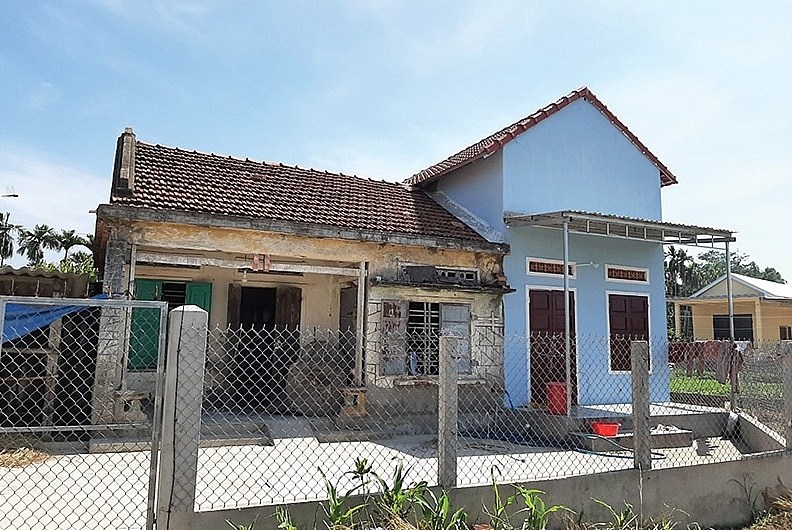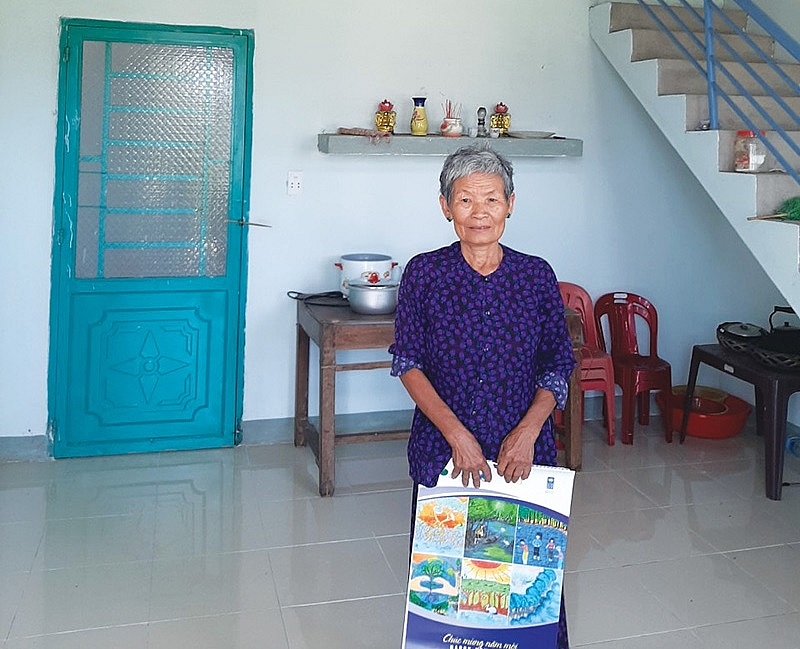Resilient homes rescue those in storm- and flood-hit areas
 |
| Flood-resilient homes have been built next to residents’ previous houses in order to minimise disruption |
Visually-impaired Nguyen Thi Ba has been living alone since her mother passed away last year. The 63-year-old wished that her mother could come back to life to witness their biggest dream come true – to enjoy a new home.
“I feel happy now that I have a new house in which I can live safely for the remainder of my life,” said Ba. She lives with some plots of rice, with an ox which she can lease to neighbours to work on the rice field to earn some money.
Located in Duc Nhuan commune of the south-central province of Quang Ngai’s Mo Duc district, construction of the 30-sq.m house began in May and was conferred to Ba in July. The storm- and flood-resilient building stands next to Ba’s former one. During storms that old house was often damaged, with the roof leaking heavily, forcing many sleepless nights on Ba and her mother.
A lifebuoy
Ba’s new house is among 35 storm- and flood-resilient homes set up in Duc Nhuan, with construction of the first beginning in 2018. The buildings are part of a project to improve the resilience of coastal communities to climate change in Vietnam, funded jointly by the Green Climate Fund (GCF), the Vietnamese government, and the United Nations Development Programme (UNDP).
The project is being implemented by the Ministry of Agriculture and Rural Development, the Ministry of Construction (MoC), and the UNDP during until 2021.
Tran Cong Oanh, representative from Duc Nhuan commune and a communal focal point of the project since 2018, said that the people here used to live in shabby conditions. Mostly farmers, they found it almost unbearable to stay in these buildings when the area was enduring storms or floods.
“All the new resilient houses have been built free of charge and provided for the local poor and female–headed households,” Oanh said. “Since moving into the new homes, their lives have become easier and they feel safer during storms and bad weather.”
In late 2019, Quang Ngai was hit seriously by a big storm named Matmo which, Oanh recalled, destroyed many houses.
“However, all the resilient houses supported by this project were not affected as their structures were prepared for such an event,” he said. “It is quite a miracle which has turned many poor farmers’ dream of owning new homes into a reality.”
All households in the commune live on rice production via two crops a year, with an average annual income of about VND6 million ($260), or VND500,000 ($22) per month, equivalent to a few cups of coffee found in big cities like Hanoi and Ho Chi Minh City.
Initially those, especially poor and female–headed households, wishing to live in the new houses must register at the local communes’ headquarters, and then are selected by an authorised team whose members are representatives from different organisations in the province. The house designs and technical specifications are approved by the provincial Department of Construction, but selected households can choose a design and local workers at their own selection, with the money supported by the project via banks.
 |
| Farmer Nguyen Thi Lang in her new storm-resilient home |
A new model
The new storm- and flood-resilient houses are based on simple designs to create a stronger structure. Features include a mezzanine level for flooding protection, reinforced roofing, and the use of strong cement. The mezzanine level allows residents to comfortably stay in their houses during a disaster, safe from high flood levels. This level can also be used as an area to store valuables during disasters and avoid it being washed away or spoiled by flooding waters.
Each house is funded from about $1,700 from the project, and another $600-800 from the government’s Programme No.48 under 2014’s Decision No.48/2014/QD-TTg on assistance in constructing storm- and flood-resilient homes for poor households in the central region. If the household wants to install additional parts or expand the houses, they mobilise their own financial resources.
In fact, these types of homes are built not only in Duc Nhuan commune, but also in many other localities in Mo Duc district, and in the three districts of Binh Son, Tu Nghia, and Duc Pho, and Quang Ngai city of Quang Ngai province. The investment capital from the GCF for constructing a total of 683 houses of the type is $1.19 million, in addition to over VND9 billion ($391,000) from the state budget, all disbursed from 2017 to 2021.
About 543 resilient houses have been constructed so far, with about 140 homes to be completed in 2020. More than 3,400 people will benefit from the project, according to the provincial Department of Agriculture and Rural Development, which is the project’s owner in Quang Ngai.
“These homes have helped protect many locals during extreme weather events. They have greatly supported the locals’ life in areas frequently hit by natural calamities in the province,” said the GCF Provincial Project Management Unit’s vice director Hoang Van Huy.
Meanwhile, Tran Cong Oanh from Duc Nhuan commune hopes to see more storm- and flood-resilient houses continue to be built in this commune. “Many poor farmers like Nguyen Thi Ba are wishing to live in such resilient houses as their existing homes are dilapidated and threaten their lives. Storms and floods are their biggest nightmare,” Oanh said.
| NGUYEN VAN LAM - Binh Thuan commune resident Binh Thuan commune is located in the flood-prone area, and people living here have to suffer damages from floods every rainy reason. Most of us work in agriculture and make only little money, so costs for things like fixing our houses are hard to cover. Thus, UNDP’s packages are very meaningful to us as the climate disasters still last. To date, about 23 households receive supports. They are all happy for the new houses whose constructions are solid enough to withstand a diversity of weather conditions. However, those houses are still quite small, and at least another 30 households need the same support. Nevertheless, this is the first year we are entitled to the packages, and we hope in the next years, most of the disadvantaged households in Binh Thuan commune will receive similar support. NGUYEN THI EM - Binh Thuan commune resident Thanks to the new house, our family could focus on earning a living instead of worrying about weather damages. Before receiving the support, we were struggling with the rainy season and floods. Our old house was easily broken, so every time we tried to fix it. Thus, instead of using the money for maintaining daily life, we had to pay a lot for fixing our house. That time was terrible. But now, everything has changed with the new house. It has a solid construction that could hold out in every kind of weather. The house is the most valuable asset of a farmer, so we are appreciating the support. Bui Thi Don - Binh Thuan commune resident Over the last few years, our family has struggled with the weather. In contrast with many households, we are not living in the flood-prone area. However, our old house was too weak to confront heavy rains. Therefore, after getting a new house, our burden has been eased a lot. We work in a farm mainly, so the income is always fluctuating and depends on the yearly crop. During every rainy season, we mostly cannot earn as much as during spring or summer. Moreover, heavy rains also impact the quality of our crops. Thus, we cannot earn that much money while our house has been destroyed at the same time. So, with the new house, one of our main problems has been resolved. Thanks to that, we can pay more attention to maintaining our income during the rainy and flood season. |
What the stars mean:
★ Poor ★ ★ Promising ★★★ Good ★★★★ Very good ★★★★★ Exceptional
Themes: Climate Change Response
Related Contents
Latest News
More News
- Trung Nam-Sideros River consortium wins bid for LNG venture (January 30, 2026 | 11:16)
- Vietnam moves towards market-based fuel management with E10 rollout (January 30, 2026 | 11:10)
- Envision Energy, REE Group partner on 128MW wind projects (January 30, 2026 | 10:58)
- Vingroup consults on carbon credits for electric vehicle charging network (January 28, 2026 | 11:04)
- Bac Ai Pumped Storage Hydropower Plant to enter peak construction phase (January 27, 2026 | 08:00)
- ASEAN could scale up sustainable aviation fuel by 2050 (January 24, 2026 | 10:19)
- 64,000 hectares of sea allocated for offshore wind surveys (January 22, 2026 | 20:23)
- EVN secures financing for Quang Trach II LNG power plant (January 17, 2026 | 15:55)
- PC1 teams up with DENZAI on regional wind projects (January 16, 2026 | 21:18)
- Innovation and ESG practices drive green transition in the digital era (January 16, 2026 | 16:51)

 Tag:
Tag:




















 Mobile Version
Mobile Version